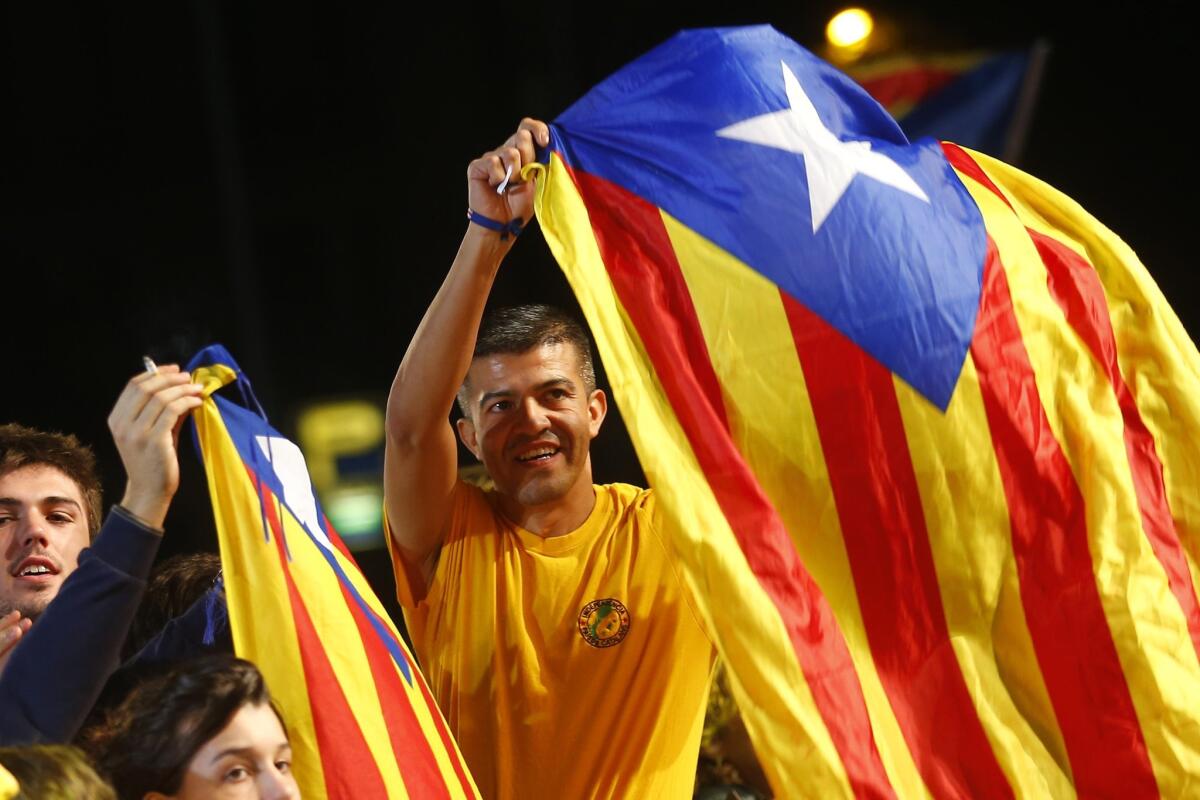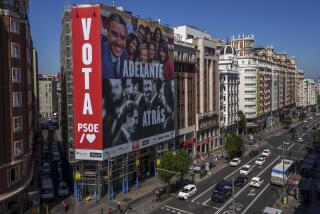Q&A: Is Spain going to lose the Catalonia region to independence?

Catalan pro-independence supporters celebrate in Barcelona, Spain, on Sept. 27, 2015. Catalan leader Artur Mas claimed victory in parliamentary elections for parties pushing for Catalonia’s independence from Spain.
- Share via
Reporting from Madrid — Separatists in Spain’s prosperous northeastern region of Catalonia celebrated Monday after an election victory that they say puts them on track to establish the world’s newest country. But their failure to win an absolute majority, and fierce opposition from the central government in Madrid, makes it likely that months of negotiations and uncertainty lie ahead.
A coalition of pro-independence parties, called “Together for Yes,” won 62 of the 135 seats in Catalonia’s regional parliament, which is based in Barcelona, in elections Sunday.
With the tally, the group has the largest voting bloc but not an absolute majority, requiring it to find a governing partner to enact its agenda, most notably an 18-month timeline for declaring Catalonia independent. The likely partner is a small, radical left-wing party, the Popular Unity Candidacy, which supports an immediate, unilateral breakaway from Spain. The Popular Unity group won 10 seats.
Meanwhile, Spain’s prime minister vowed Monday to block the creation of an independent state of Catalonia at all costs, calling it unconstitutional.
Here’s a look at the issues surrounding Catalonia’s vote and its consequences.
Q: Who actually won Sunday’s elections?
A: Both sides are claiming victory.
Catalan President Artur Mas, the dominant figure in the pro-independence coalition Together for Yes, called Sunday’s results a “victory of the ‘yes,’” meaning a “yes” for independence. With the coalition capturing the most seats in the regional parliament, “we know we have the democratic mandate,” Mas said late Sunday, while votes were still being counted. “We have won and that gives us an enormous strength to push this project forward.”
But those who want Catalonia to remain part of Spain point out that 52% of voters endorsed candidates and parties Sunday that do not favor secession. They say Mas has no such mandate for Catalonia to break away from Spain and called on him to resign instead.
Q: What comes next?
A: The coalition will try to build a governing majority of 68 seats in Catalonia’s parliament. It already has 62 seats and needs only six more. The Popular Unity party’s 10 seats would be more than enough. Negotiations are probably underway, though they have not been publicly announced, between the coalition and Popular Unity leader David Fernandez.
Coalition-building could take weeks or months and could paralyze the parliament. If Popular Unity refuses to make a deal with the coalition, new regional elections might have to be held.
Q: But doesn’t the Popular Unity party support independence also?
A: Yes, but it is not part of the coalition because it opposes the austerity measures and privatizations that have been emblematic of Mas’ center-right business-friendly party, the Democratic Convergence of Catalonia. The Popular Unity party has long been at odds with Mas. On Monday, Popular Unity spokeswoman Anna Gabriel told reporters that the Catalan president “is not essential” to the drive for independence.
Fernandez has also said that he wants an immediate, unilateral declaration of independence from Spain rather than the 18-month timeline proposed by Mas and his allies. But Popular Unity spokesman Antonio Baños suggested Monday that his party could be flexible.
Q: What is the Spanish government’s position?
A: The central government in Madrid considers secession in violation of Spain’s Constitution, which stipulates the “indivisible unity” of Spain. Prime Minister Mariano Rajoy said Monday that he would not compromise on that question.
“I am ready to listen and to talk, but not in any way to liquidate the law,” he said. “I am not going to talk about either the unity of Spain or sovereignty.”
Q: So can Catalonia become independent and, if so, when?
A: It would be an arduous and contentious process. According to the coalition’s 18-month timeline, the first moves would be to create a Catalan tax office to collect revenue locally and to establish a network of Catalan embassies abroad.
Both those moves are considered illegal by the central government and would probably be blocked by the courts.
Rajoy’s conservative government recently approved a new law giving the Constitutional Court the power to sanction elected officials and civil servants who fail to comply with its rulings. Catalan officials, for example, could be fined or suspended from office. Catalan officials have not said publicly whether or how they might resist such suspensions, if they were imposed.
But well before the separatists’ 18-month deadline, Spain will hold nationwide elections, probably in late December, whose outcome could change Catalans’ ideas about independence. If Rajoy falls from power, a new government in Madrid could negotiate enhanced powers of taxation or spending for Catalonia, which could alleviate discontent and avert a declaration of independence.
Q: How is Catalonia different from the rest of Spain?
A: Catalonia is a region of about 7.5 million people in northeastern Spain, bordering France. It is Spain’s wealthiest region, per capita, with lots of industry -- car factories and ports. It generates about one-fifth of Spain’s GDP, and its economy is about the same size as Portugal’s. Catalonia is also Spain’s biggest tourist hub, with Barcelona as its capital.
Catalonia has its own culture and language, called Catalan, distinct from those in other parts of Spain, and the region has long sought greater autonomy. Many Catalans fought on the losing Republican side of the Spanish Civil War in the late 1930s. Afterward, under the nearly 40-year dictatorship of Gen. Francisco Franco, who died in 1975, Catalan language and some local festivals were banned. Many Catalans say they feel different from other Spaniards because of that history of repression.
Some Catalans also trace their drive for independence to a more recent event: Spain’s economic crisis. They believe their wealthy region pays an unfair share of taxes to the central government in Madrid.
Q: Have they voted on independence before?
A: In November, Catalonia held an unofficial, informal, symbolic referendum on independence from Spain. More than 80% of those who cast ballots backed secession from Spain. But the government in Madrid considered the vote illegal and nonbinding. Turnout was therefore low, about 42%.
By contrast, the turnout in Sunday’s elections was about 77%, a record in the region.
Frayer is a special correspondent.
More to Read
Sign up for Essential California
The most important California stories and recommendations in your inbox every morning.
You may occasionally receive promotional content from the Los Angeles Times.












